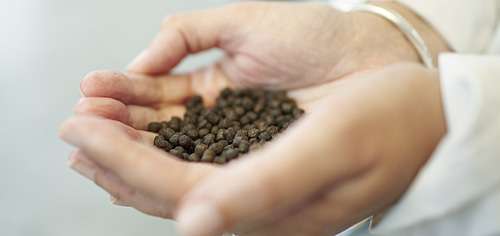Raising efficiency, sustainability in salmon farming

Increasingly, plant-based ingredients are being substituted for marine ingredients in fish feed. Is there a limit to how much of a vegetarian diet salmon can tolerate? Marta Bou Mira is seeking answers.
Roughly speaking, production of Norwegian salmon doubled from 2000 to 2010. In the same period, however, the feed industry's access to fishmeal and fish oil has been significantly reduced, leading to dramatic changes in the composition of feeds.
While salmon feeds were previously based entirely on marine ingredients, a report by the Norwegian Institute of Food, Fisheries and Aquaculture Research (Nofima) shows that nearly half of the diet of farmed salmon in 2010 consisted of plant proteins and plant oils. The current proportion of plant ingredients is even higher – and it may continue to climb.
Finding salmon's limits
"So far it appears that the increase in plant-oil content in Norwegian salmon feed is working well when it comes to growth. But we are beginning to see a reduction in the amount of the good marine fatty acids in salmon products," cautions Nofima's Marta Bou Mira.
Her doctoral project is focused on finding the maximum limit for use of plant oils in salmon feed.
"I want to be able to document the minimum requirements for omega-3 fatty acids in feed used in the modern, commercial aquaculture industry," says Ms Bou Mira. "Minimum requirements must ensure adequate growth and product quality without compromising fish welfare."
Long-term feeding trial
Ms Bou Mira is carrying out a long-term feeding trial to study salmon development from the weight of 40 g until 3 to 4 kg. During the growth phase from 40 to 400 g, she will test 14 different diets with varying proportions of marine fatty acids (the essential fatty acids EPA and DHA). Fish weighing 1?4 kg will be fed one of three diets.
"With this design we hope to determine the minimum requirements for the essential fatty acids in different seawater phases for salmon," explains Ms Bou Mira. "Following the subjects' development over such a long time will enable us to find and understand early symptoms of EPA and DHA deficiencies."
She believes the research project will help the feed industry to utilise feed ingredients as rationally as possible while still maintaining adequate levels of marine fatty acids to safeguard fish welfare.
"This is knowledge that will enhance both the efficiency and sustainability of the Norwegian aquaculture industry," concludes Ms Bou Mira.
Provided by The Research Council of Norway


















